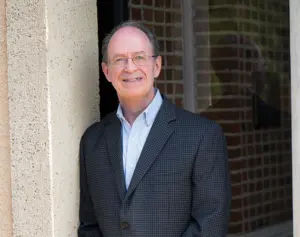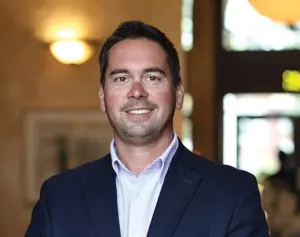For the past two years, manufacturers have told Enterprise Minnesota’s annual State of Manufacturing® (SOM) survey that their top aspiration has been “to be considered a great place to work.”
Many observers consider the Aagard Group in Alexandria an exemplary employer for the way it brings new hires into the fold and makes them feel valued with the help of a mentoring program.
“They invest back in their people,” says Michele Neale, a business growth consultant for Enterprise Minnesota.
Aagard designs and manufactures automated packaging systems, custom-built for a wide variety of businesses.
Sharlo Meyer, director of human resources and organizational development, says the business has seen demand for its services grow through the pandemic, largely as a response to a tight labor market and the push to automate.
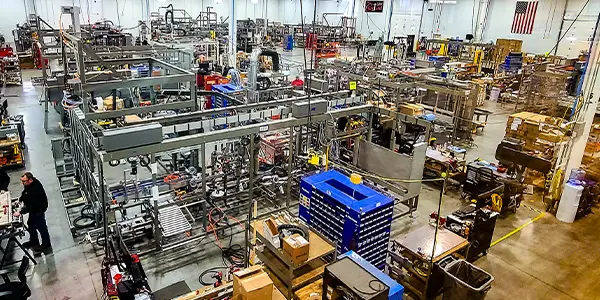
“That’s what we do,” she says. “We automate those processes to help clients deal with labor constraints.”
Aagard has enjoyed steady growth. The company employed 90 people when Meyer joined the company about 15 years ago. That number had doubled by 2016, and today the business has just shy of 300 people on its payroll.
Aagard hired 26 people in the past year, all of whom were paired with mentors.
Neale praises the practice, saying it helps new hires feel “that there’s somebody they can talk to and ask questions of.”
Meyer says the approach makes a difference and helps build a sense of camaraderie.
“We want new people to have a welcoming experience,” she says. “We have found that if they have at least one person who they feel a connection with — kind of a go-to person — they just feel so much more comfortable.”
Mentors and mentees go to lunch on the company’s dime once a week during the first month of employment.
“It’s really all about building relationships,” Meyer explains.
She says employees who have benefited from mentorships are eager to serve as mentors themselves, as they gain greater experience.
Aagard also strives to create an inviting environment by welcoming table tennis, foosball, and cornhole games into its lunchroom.
“There’s just a lot of fun that happens during breaks,” Meyer says, explaining that the friendships can lead to better teamwork and worker retention.
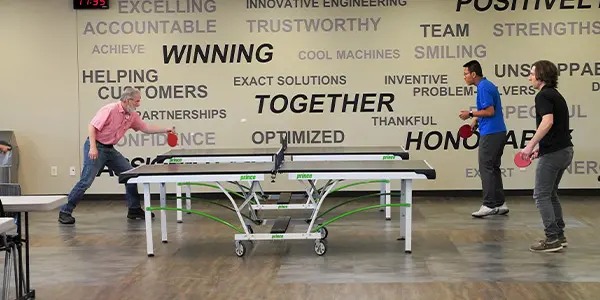
The upbeat culture of the company is palpable, even for casual visitors, as evidenced by the number of smiling faces Neale says she regularly encounters around its two facilities.
“There’s an energy in the building,” Neale says. “You just can’t help but know that’s a great place to work.” Meyer says smiles are to be expected at Aagard.
“One of our values is positivity. We’re looking for people who do smile and bring that positive energy. We look for those types of attributes when we interview people, because those are the values we want to bring in. A lot of it goes back to hiring to our values and being very true to that,” she explains.
Aagard prides itself on maintaining a bright, clean, inviting workspace, Meyer adds.
“That stigma of manufacturing being dirty and dingy is just not the case. It’s a very technical career, and we provide a very nice environment for our people,” she says.
Aagard doesn’t refer to staff as employees, Meyer says, but rather as team members, “because we are.”
“Our values are winning together honorably, passionately, and positively,” she says.
“With the very complex equipment that we are building and designing, it takes a lot of brainstorming and people’s minds coming together to come up with the concepts and build these systems,” Meyer says.
Working as a team is just critical, she adds. “We’re always bouncing ideas off one another.”
“They’re part of an elite group of employers in that they have their values and they really try to live out those values every day,” Neale says. “They’re not just words on a page or words on a wall.”
That commitment to maintaining open lines of communication sets Aagard apart in Neale’s eyes. “I think it’s all about collaboration. They want to make sure opinions are shared and heard.”
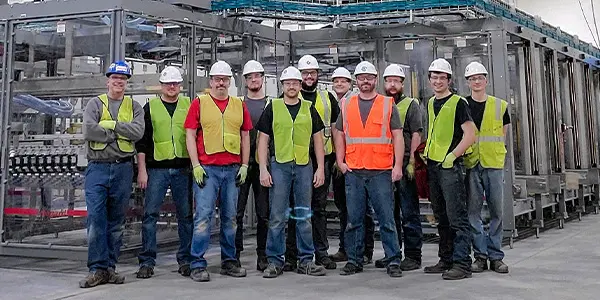
Aagard recruits new talent from colleges and technical schools throughout the Upper Midwest.
The company typically has about 20 summer interns and around a dozen internships that run through the academic year.
“It’s a great pipeline for us. And the goal is to convert our interns into full-time hires. We’re very transparent about that,” Meyer says. “We hire the best people we can, and we grow them.”
Deepening the Talent Pool
Winona’s local employers underwrite college
With the knowledge that a deeper local talent pool benefits all employers, many manufacturers are removing barriers to higher education.
This fall, for example, individuals and organizations in the Winona area — including five manufacturers — underwrote the “College Opportunity Program,” a scholarship that covers tuition and other materials at Minnesota State College Southeast.
“I was honestly blown away by the response from our local business community,” says Marsha Danielson, the college’s president. “They were amazingly generous,” she says of business support for the three-year, multi-million-dollar pilot program.
When Danielson began her leadership position in July 2021, she recalls reviewing reports that showed slipping enrollment numbers for Minnesota colleges, with one exception: Riverland Community College in Austin and Albert Lea.
A subsequent meeting with then-Riverland President Adenuga Atewologun introduced Danielson to the Austin Assurance Program, which was born out of the college’s partnership with The Hormel Foundation.
“I just thought it was such a wonderful idea, because employers are having such a hard time finding the talent that they need,” she says.
Nationally, about 40% of high school students graduating today do not receive any additional training or formal education.
“And our local high schools are in that same ballpark,” Danielson says, noting that the largest barrier is typically financial rather than academic. That holds for reasons why people say they choose to drop out of college, too.
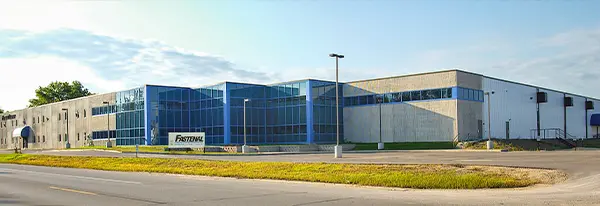
Fastenal, the Winona-based distributor of industrial and construction products, became an early supporter of the local initiative.
Company CEO Dan Florness says Fastenal has long been a strong supporter of education, and it’s a firm believer in worker development.
Florness was quite willing to hear Danielson’s pitch.
“Generally speaking, we hire folks early in their career when they don’t have a lot of experience with doing business. We go out and find great people. We ask them to join, and we give them a reason to stay,” he says. “One reason is how we treat each other, and another is how we challenge each other and develop each other.”
He says it doesn’t matter whether students who enroll in the program get a two- or four-year degree. “They’re going to be a better employee in the community. They’re going to be a stronger member of the community, and quite frankly, for a bunch of these kids, we might change their outlook for life.”
“All of a sudden it opens up the opportunity for this person to have a more meaningful career. And that’s better for everybody,” Florness adds.
The Winona program is one of about 350 similar “promise programs” across the nation that come in “many different flavors,” according to Danielson. But Southeast’s program stands out for its sheer simplicity.
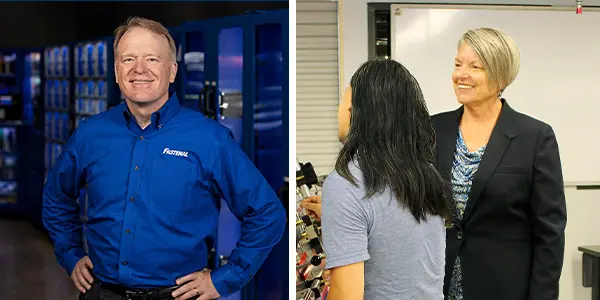
The sponsors didn’t limit the program to certain fields of study applicable to their labor needs.
“They didn’t want people to decide to go into an occupation in order to get the free tuition and fees. What they wanted students to do is know they have the opportunity to go to college and improve themselves, wherever their passion lies,” Danielson says.
Danielson initially wanted to require participants to maintain a minimum grade-point average of 2.0, until she ran into a CEO who said, “I run a world-wide company, and I was a D or worse student. I think we’re eliminating people and their potential if we do that.”
“Everyone in the room agreed,” Danielson recalls.
So far, almost 130 students have expressed interest in the program. Of those, 116 were admitted, and 81 had registered at Southeast as of late July. The college’s total annual enrollment has been running at about 2,500.
Danielson says the program could yield benefits on multiple fronts.
“There are companies that move to communities with promise programs because they’re investing in their youth, and they know there’s a pipeline into that local workforce,” she says.
“I feel that with increased automation and increased IT and AI, that our manufacturers realize their employees are going to need to have higher skill levels and knowledge beyond what a high school education provides,” Danielson says.
She cites anecdotal evidence that families in the Austin/Albert Lea area were relocating to gain access to the educational benefits.
Danielson says Southeast is looking to provide wrap-around support, including help with admissions and financial aid paperwork, too.
The perceived financial barriers to higher education are often less formidable than people might suspect, given the various forms of support that are available, Florness says.
But he notes the College Opportunity Program encourages young people to consider a path they might otherwise have ruled out by providing what Florness calls “a financial backstop” of sorts, should other aid sources prove inadequate.
Danielson describes the offering as a “last-dollar program” that kicks in to fill any financial gaps that may emerge.
Florness says the program is intended to “demystify” funding for higher education.
“Sometimes you have bright kids who don’t feel motivated. Then all of a sudden, they see: Here’s an opportunity in my life that maybe I didn’t see before,” Florness says.
That can lead to an important “light-bulb moment,” he suggests.
Fastenal does business in 26 countries. The company employs around 1,700 in Winona and 23,000 world-wide.
Florness believes local employers’ support for the College Opportunity Program sends a message.
Florness suggests other communities could follow suit.
“Things like this can gain traction. And I don’t think Winona is unique or Austin is unique in that regard. A lot of communities have people who would get behind something like this,” he says.
Evolving with the Times
Hot and dirty work? Not at Dotson.
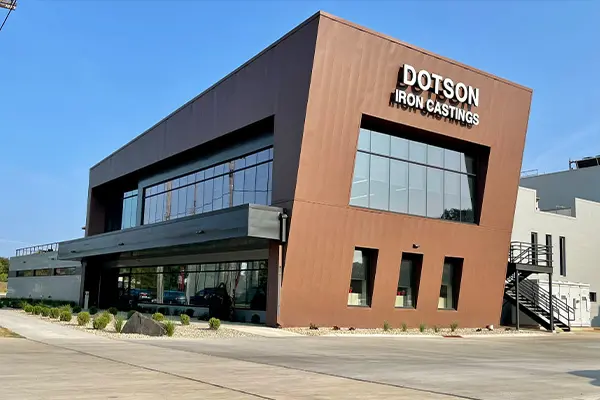
In more than a century of business, Dotson Iron Castings of Mankato has seen tremendous change, and its modern-day foundry operations are a far cry from what people might conjure up when they think of an industry notorious for hot and dirty work.
Dotson prides itself on operating a high-tech, automated facility that has made its production more precise, less labor-intensive and considerably cleaner.
Tyson Twait, who directs operations at Dotson, says the company hosts tours and regularly receives comments about the surprising cleanliness of its operations.
“From a foundry standpoint, we’re pretty proud of the upkeep and the automation that’s been put in to try to reduce some of the physical burdens placed on people in the past,” he says.
Dotson also constructed a 7,800-square-foot employee center last year, offering staff private shower facilities, locker rooms, break space and a top-of-building patio terrace where folks can unwind.
“You try to pencil in an ROI on adding a multi-million-dollar employee center,” Twait says. “Well, there’s honestly no payback. But there were things the group wanted to have. We wanted a nice outdoor space. We wanted quiet spaces. We wanted clean spaces.”
Twait says the ultimate benefits include happier employees and a better community image. The company has a workforce of about 140 people.
Dotson also installed a new lunchroom with a wide selection of food in partnership with an open-vending company.
“It’s just open coolers and shelves, where you can grab food and self-checkout,” Twait says. The food is much better than the old sandwich dispenser, which Twait says they called “the wheel of death.”
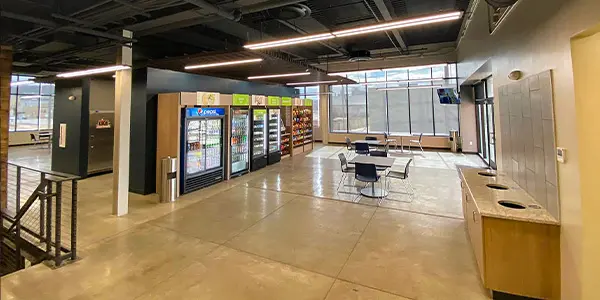
Dotson has seen its share of adversity. In 2017, the foundry endured a fire that caused about $5 million in damage, though thankfully no one was hurt.
The facility had to pause production as the company regrouped. But Dotson didn’t want to lose its most precious asset: its workers.
Even while operations were on hold, Dotson kept its workers on the payroll and paid them to engage in community service, helping others and building civic pride, plus a greater sense of staff cohesion.
“We do a ton of outreach in our local community,” says Twait, who also chairs the local United Way.
To build awareness of opportunities in its industry, Dotson works with local schools, providing “a foundry in a box” with quick-cooling nickel and sand molds.
The company also reimburses tuition for employees interested in further study in any field. One employee famously used the benefit to study artisanal breadmaking, Twait says.
Twait envisions future demand for employees who understand PLCs, robotics, and electronics. “Those are just the facts of life,” he says. “But do they necessarily need a four-year degree? No.”
Dotson hires some people straight out of high school at starting wages upwards of $24 per hour.
The company pays keen attention to the welfare of its workers. Twait says Denny Dotson, the foundry’s former owner, was known to buy cigarette packages from employees for $100 a pop, in order to encourage them to quit smoking. Staff also have ready access to visiting mental health professionals and occupational therapists.
“We’ve tried to be a good employer first, for a very long time,” Twait says.
Earlier this year, Dotson was purchased by its largest single customer, MacLean Power Systems, a leader in the power transmission industry.
Twait, Dotson’s former president and CEO, has stayed on with a title change to vice president and general manager of Mankato operations for MacLean.
The foundry has stayed extremely busy through the pandemic.
“From our standpoint, we saw historic orders placed. Some months we had orders for three times what we could produce,” Twait says.
“Instead of taking on more water, we decided to let go of some customers to make sure the ship didn’t sink along the way,” he recalls.
“We’ve tried really hard to be diversified. So, we’re about a third agriculture, a third heavy commercial truck, and then the other third is kind of a combination between pumps, compressors, and industrial stuff, including valves,” Twait says.
Family Values
JDM Machining locks pandemic-era growth
Jeremiah Miller, founder of JDM Machining, today employs 33 people at his 25,000-square-foot precision machining shop near Staples. He began his career as a machinist in high school and built JDM from the ground up after the company that employed him in Baxter went under in 2000.
He started alone in a 1,200-square-foot shop with a single vertical mill but quickly began attracting orders from positive word-of-mouth about his abilities. The business grew, enabling Miller to steadily add people and machines. The facility has been upgraded repeatedly in 2004, 2012, and 2021.
Miller works alongside his wife, Sara, a co-owner and office manager in a clean modern shop, and the couple has built an experienced team of valued employees capable of building to exacting standards with quick turnaround times. He says each day begins with a huddle “to give the guys time to organize, clean areas, and review why we do what we do.”
During the pandemic, JDM saw business surge as customers like Polaris and Arctic Cat were willing to pay top dollar for parts within severe supply shortages, Miller says.
He believes the pandemic shortages emphasized the value of having a domestic supply chain, a realization that could have a lasting impact on business.
Miller says JDM had to turn some work away during the pandemic, but the company has been able to shorten its lead times in recent months.
JDM operates with two shifts, day and night, producing all manner of molded, tooled and turned parts for applications ranging from recreational equipment to medical devices.
“We don’t have such a hard time finding people, because we pay well,” Miller says. “You can’t live on $12 per hour. And I think it helps that our shop is all AC, and we have a full-time janitor who keeps it clean.”
Miller says precision machining is comfortable work that doesn’t involve much menial labor. “You could come to work in a dress shirt, because you sit at a computer half the day, programming. And you don’t get real dirty doing that.”
JDM offers its employees flexible schedules, too, to accommodate single parents as well as folks stepping up to coach area youth sports.
“About half our business is tool-and-die onesies and twosies. Then, the other 50% is higher-volume production,” he says.
The company is currently working on its AS9100 certification to qualify for more work in aerospace and with the military, as their customers in the recreation industry are experiencing a decline. High sales of recreational vehicles during the pandemic oversaturated the market, he says. That, combined with the cost of the machines and higher interest rates, have caused sales to taper.
“Being diversified helps us a lot,” Miller says.
JDM continues to grow, but Miller has no immediate new facility plans.
A 10,000-square-foot addition added two years ago is about 80% full, he says.
Loyal to Its Roots
Mattracks brings jobs and music to its tiny community.
Mattracks Inc., based in Karlstad, a town of about 700 people in northwest Minnesota, sells its rubber-tracked propulsion assemblies to customers in more than 140 countries.
But Glen Brazier, the company’s founder, considers the business’ remote location to be more of a blessing than a curse.
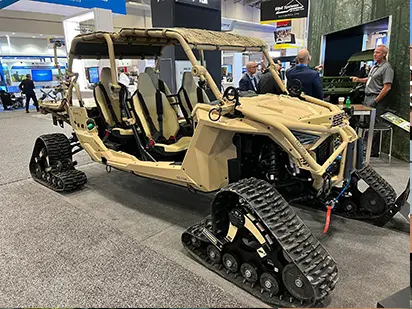
The manufacturer employs about 65 people, and Brazier feels fortunate to have such a stable team. At 71, he says, “I’ve got people who have worked for me for going on 30 years.”
He doubts that degree of workforce longevity could be expected in a large metro area, saying: “We don’t have the kind of turnover you’d see in larger cities.”
Brazier doesn’t take that loyalty for granted, however, and has placed a stake in making sure Karlstad is one small town that never fades off the map.
He’s supporting efforts to construct a local airport to replace the small, grass landing strip that currently serves the community. After procuring land and funding, a new airport with a proper tarmac could be operating in Karlstad next year, making it the first Minnesota airport to open in two decades.
Brazier expects the airport to open new doors for Mattracks and other area businesses that are currently more than an hour removed from modern air service.
“It’s a huge deal for Mattracks, because we have million-dollar deals to close, and we need to close them right now,” he says. “We have a bright future, and it’s only going to get better.”
Brazier says that about one-third of Mattracks’ total sales are to military customers, another third come from the agricultural sector and the final third is channeled into other markets, including recreation and emergency response applications.
Having grown up in Greenbush, another small town 19 miles to the northeast of Karlstad, Brazier has honed his appreciation for rural communities and all they have to offer.
“Karlstad welcomed us with open arms,” he says, recalling Mattracks’ purchase of an abandoned local potato warehouse to begin production in 1994.
Brazier says he remains a firm believer in reciprocity.
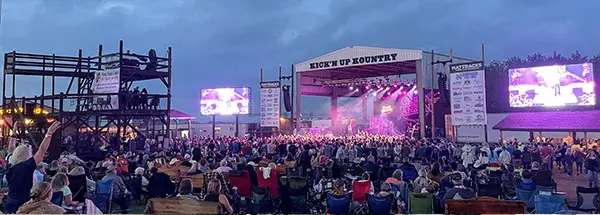
Toward that end, he signed on as an original sponsor of a music festival called Kick’n Up Kountry in nearby Hallock, later moving the event to Karlstad, where he also purchased 360 acres to accommodate guests. Now on its 20th year, the four-day festival boasts gate sales of about 30,000.
Brazier says he can barely keep a beat but nevertheless has recognized the profound ability of music to bring people together.
A business can’t just take from its community, Brazier says. “That’s no good. You have to give back.”
Return to the Fall 2023 issue of Enterprise Minnesota® magazine.

